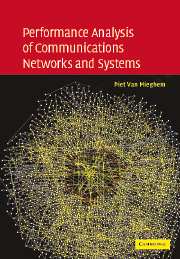Preface
Published online by Cambridge University Press: 22 February 2010
Summary
Performance analysis belongs to the domain of applied mathematics. The major domain of application in this book concerns telecommunications systems and networks. We will mainly use stochastic analysis and probability theory to address problems in the performance evaluation of telecommunications systems and networks. The first chapter will provide a motivation and a statement of several problems.
This book aims to present methods rigorously, hence mathematically, with minimal resorting to intuition. It is my belief that intuition is often gained after the result is known and rarely before the problem is solved, unless the problem is simple. Techniques and terminologies of axiomatic probability (such as definitions of probability spaces, filtration, measures, etc.) have been omitted and a more direct, less abstract approach has been adopted. In addition, most of the important formulas are interpreted in the sense of “What does this mathematical expression teach me?” This last step justifies the word “applied”, since most mathematical treatises do not interpret as it contains the risk to be imprecise and incomplete.
The field of stochastic processes is much too large to be covered in a single book and only a selected number of topics has been chosen. Most of the topics are considered as classical. Perhaps the largest omission is a treatment of Brownian processes and the many related applications. A weak excuse for this omission (besides the considerable mathematical complexity) is that Brownian theory applies more to physics (analogue fields) than to system theory (discrete components).
- Type
- Chapter
- Information
- Performance Analysis of Communications Networks and Systems , pp. xi - xiiPublisher: Cambridge University PressPrint publication year: 2006
- 1
- Cited by



